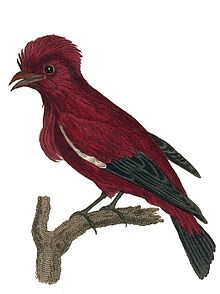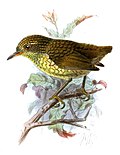| Crimson fruitcrow | |
|---|---|

| |
| Conservation status | |
 Least Concern (IUCN 3.1) | |
| Scientific classification | |
| Domain: | Eukaryota |
| Kingdom: | Animalia |
| Phylum: | Chordata |
| Class: | Aves |
| Order: | Passeriformes |
| Family: | Cotingidae |
| Genus: | Haematoderus Bonaparte, 1854 |
| Species: | H. militaris |
| Binomial name | |
| Haematoderus militaris (Shaw, 1792) | |

| |
The crimson fruitcrow (Haematoderus militaris) is a species of bird in the large family Cotingidae, not a crow. The only member of the genus Haematoderus, it is found in Brazil, French Guiana, Guyana, Suriname, and Venezuela. Its natural habitat is subtropical or tropical moist lowland forests. Because of its large range and population density this species is not classified as vulnerable.
Description
The crimson fruitcrow is a large bird about 34 centimetres (13 in) long. The adult male has glossy crimson plumage on head, back and breast, the feathers being long and stiff. A bushy crimson crest is sometimes raised. The wings and tail are dark brown to black, the tail being partly concealed by the long tail-coverts. The female and the immature male have a paler crimson head, throat and underparts, the back, wings and tail being dark brown and the feathers being more flexible. Both sexes have thick, dark red beaks.
Distribution
This species is native to the tropical, lowland rainforests of Guyana, French Guiana and northeastern Brazil. There have been occasional sightings outside its normal range, in west Brazil and east Venezuela. It is an uncommon species and is present in the forest canopy and at the verges of woodland.
Behaviour
Despite its name, this fruitcrow feeds mainly on large insects such as cicadas, beetles and grasshoppers; it supplements this diet with fruit. Its flight is leisurely and looping, and a display flight, involving ascending in a corkscrew fashion followed by a long glide, has been documented. It perches high in the canopy, each bird seeming to have a favoured spot. Although usually silent, this bird can emit a low hoot reminiscent of an owl, and also has a sharp "bok" call.
Status
The crimson fruitcrow is generally rather uncommon and patchy in its distribution, and its population size may be declining slowly. However, it has a very extensive range, and the International Union for Conservation of Nature does not consider it threatened and has assessed its conservation status as being of "least concern".
References
- ^ BirdLife International (2017). "Haematoderus militaris". IUCN Red List of Threatened Species. 2017: e.T22700919A110782619. doi:10.2305/IUCN.UK.2017-1.RLTS.T22700919A110782619.en. Retrieved 12 November 2021.
- Sclater, Philip Lutley (1862). Catalogue of a Collection of American Birds. N. Trubner and Company. pp. 238, 257.
- "Birdlife International". Archived from the original on 2014-07-14. Retrieved 2013-01-18.
- Ridgely, Robert S.; Tudor, Guy (2009). Field Guide to the Songbirds of South America: The Passerines. University of Texas Press. p. 512. ISBN 978-0-292-71748-0.
- ^ Ridgely, Robert S.; Tudor, Guy (1989). The Birds of South America: Vol. II, The Suboscine Passerines. University of Texas Press. pp. 772–773. ISBN 978-0-292-77063-8.
- Snow, D.; Sharpe, C.J. (2015). "Crimson Fruitcrow (Haematoderus militaris)". Handbook of the Birds of the World Alive. Lynx Edicions, Barcelona. Retrieved 2015-08-30.
| Taxon identifiers | |
|---|---|
| Haematoderus | |
| Haematoderus militaris |
|
